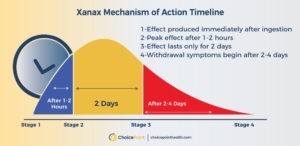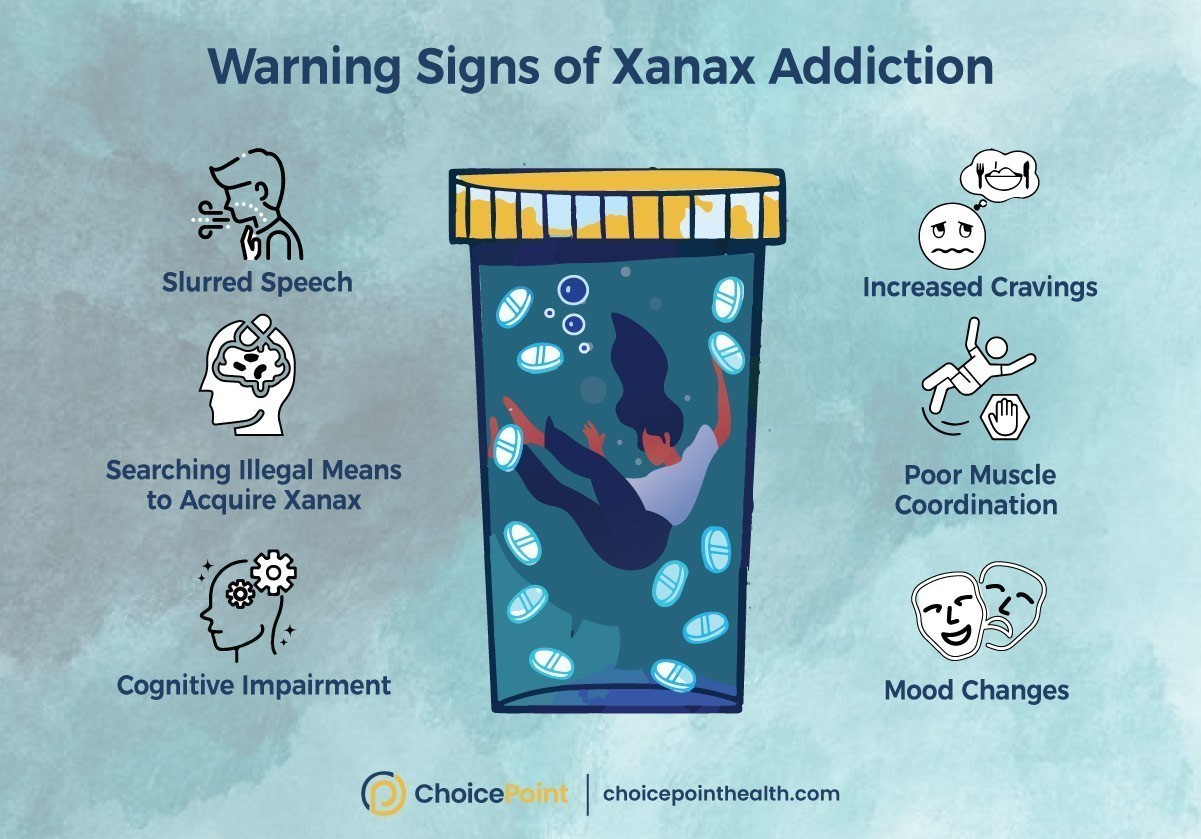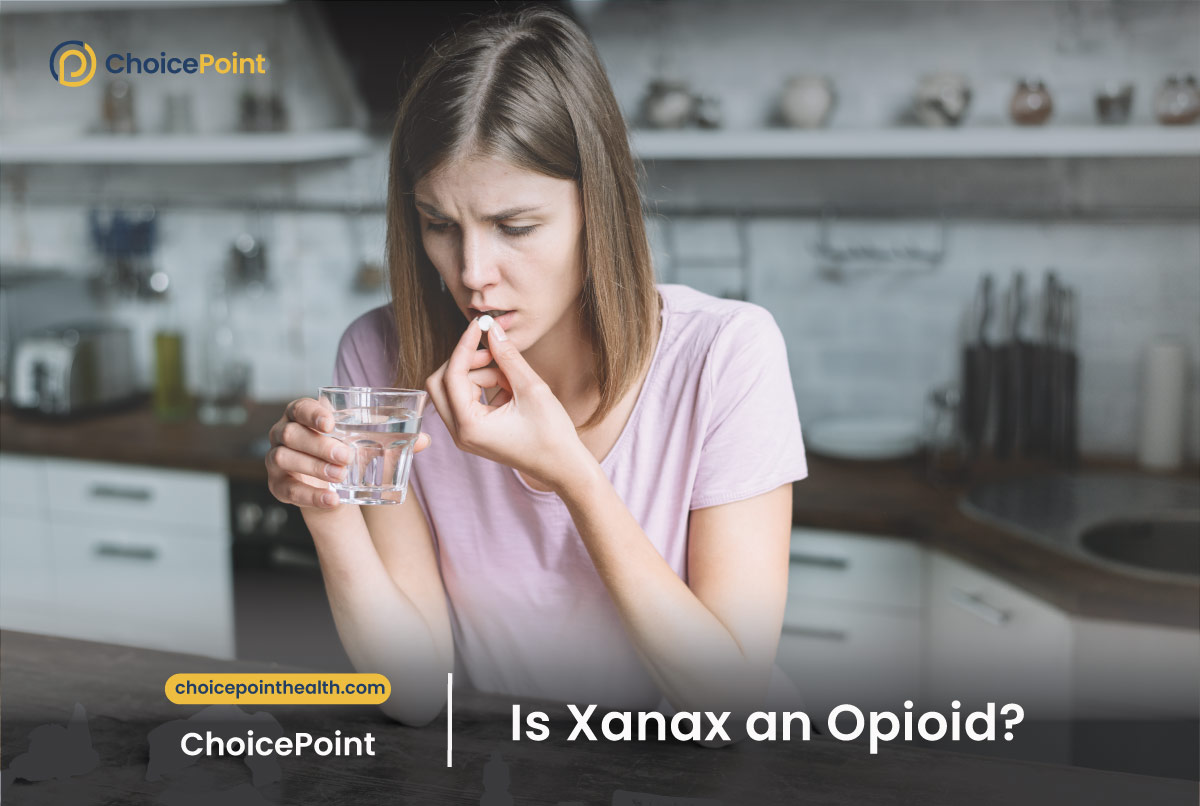With people being rightfully concerned about mental health now more than ever, the prescribing of anti-anxiety medications has tripled over the last decade. There is absolutely no denying that Xanax is effective for various mental health and physical disorders. But, it is extremely addictive when used in the long term.
That being said, our aim is not to create panic but to raise awareness about Xanax. We are here to help you understand everything about Xanax and to provide effective treatment strategies to help you overcome and prevent Xanax abuse once and for all.
Highlights of our clinically-reviewed blog include:
- Is Xanax an opioid?
- Is Xanax safe to use?
- Abuse and addiction potential of Xanax
- How to overcome Xanax addiction
Table of Contents
What Is Xanax? Is Xanax an Opioid?
Before we answer, Is Xanax an opioid? Let’s learn about Xanax first.
The medical name of Xanax is Alprazolam. It is commonly prescribed to treat:
- Anxiety disorders
- Insomnia
- Sleep-related disorders
- Alcohol addiction treatment to manage withdrawal symptoms
Xanax is the most prescribed psychiatric medicine. It affects the central nervous system by promoting feelings of calmness and relaxation. Hence, it is prescribed to treat insomnia and anxiety.
Now let’s answer the main question, is Xanax an opioid? The answer is; No, Xanax is not an opioid, but it doesn’t mean it is not dangerous. It is dangerous because of its high abuse potential.
Xanax belongs to the class of drugs known as benzodiazepines. It is a short-acting benzodiazepine. This results in a state of calmness and euphoria; as a result, many people start using it for recreational purposes. But, Xanax (benzodiazepine) abuse should not be taken lightly. Benzodiazepine overdose can lead to seizures and, Yes, even death!
If you think you are suffering from Xanax abuse, please do not delay your treatment and schedule an appointment with a consultant at ChoicePoint. Through telehealth addiction treatment programs, our virtual services can help you begin your treatment in a safe and confidential environment. Remember, timely intervention is the only key to a quick recovery.
What Is Benzodiazepine?
Now, we will discuss Benzodiazepines in detail to answer any further queries you might have.
Benzodiazepines or ‘benzo’ are a class of medications that acts as sedatives and tranquilizers. These help calm our nervous system and are specifically designed to treat anxiety, fear, tension, and depression.
Benzodiazepines have high abuse potential. Therefore, these are labeled as Schedule IV drugs by the FDA (Food and Drugs Authority). This means that benzodiazepines are controlled substances.
Some examples of benzodiazepines include:
- Valium
- Librium®
- Klonopin
- Avitan
Benzodiazepines Vs. Opioids: Major Differences
Benzodiazepine and opioids both have high abuse potential. Then where lies the difference?
Benzodiazepines act as sedatives and depressants and they numb the senses. Their sedative properties make them a choice of the drug during surgeries. On the other hand, the depressive property helps to control and calm nerves during panic attacks.
Whereas, on the other hand, opioids are analgesics and act as pain-relievers. Our brain has specialized pain receptors. Opioids bind to them and reduce the perception of pain. Opioids include both street drugs and prescription-based medications. For example, illegal Street drugs include Heroin and Opium, whereas prescription drugs include Oxycodone, Morphine, Fentanyl, Hydrocodone, etc.
Remember, both opioids and benzodiazepines fall under the category of most abused prescription medications. When taken together, these are extremely dangerous. That is why ChoicePoint offers detox and addiction treatment programs targeting both benzodiazepines and opioid addiction. Our high-quality virtual and in-person addiction treatments combined with result-oriented therapy can help you lead a healthy, peaceful, and sober life.

Xanax action mechanism
How Does Xanax Work?
Whether you are prescribed Xanax for the first time or thinking that you might be using more than the recommended dose, it is important for you to understand how Xanax works. Xanax has a rapid onset of action. As you ingest Xanax, it travels in the bloodstream and attaches to a brain receptor known as GABA-A (gamma-aminobutyric acid-A)
When Xanax binds to GABA-A receptors, it stimulates and increases the release of a neurotransmitter known as GABA. Now, GABA is a major inhibitory neurotransmitter. It inhibits or decreases the signals traveling to the brain, resulting in an overall decrease of activity in the nervous system.
Now let’s explain this process in terms of Xanax producing an effect to reduce anxiety. Think of it this way. When you feel anxious, there are millions of signals traveling to the brain, which induces anxiety. Benzodiazepines cause increased release of GABA, which in turn reduces anxiety-inducing signals to the brain, and a person feels less anxious.
Is Xanax Safe to Use?
Drugs have been around for a while now. However, with little knowledge about long-term effects and fewer advances in science, people began to develop an addiction to them. Yes, this means that Xanax is an effective drug if used within the safe limits, as recommended by a doctor. Usually, the recommended dose for anxiety disorders is 0.25mg to 0.5mg daily. And the maximum dose is 4mg daily.
But, we highly recommend that you should follow your doctor’s advice and do not take more than the recommended dose, as it may lead to Xanax abuse and ultimately addiction!
Wondering You Might be Addicted to Xanax?
Still wondering after getting the answer, ‘Is Xanax an opioid.’ This might be because you are now concerned you are abusing Xanax, or you might have already developed an addiction to it.
Here are some physical signs to look for that indicate that you might be suffering from Xanax addiction:
- Physical weakness
- Poor judgment and decision-making ability
- Lack of coordination
- Insomnia
- Tremors
- Memory lapse
You should also take note of behavioral signs such as:
- Secretive behavior when acquiring Xanax prescription
- Withholding abuse information from your doctor
- Lack of attention to hygiene
- Indulging in immoral behaviors to acquire Xanax
- Mood shifts
A more authentic way to assess that you might be developing an addiction to Xanax is through an assessment quiz. ChoicePoint has a completely confidential, and free addiction assessment quiz to help you determine if you are suffering from addiction. A few minutes of your time spent on assessment can save you from the long-term side effects of Xanax abuse.

Look for Xanax Addiction Symptoms!
Why Is Xanax Addictive?
According to American Psychiatric Association, more than 1 in 8 adults are prescribed benzodiazepine yearly; among them, 17% of people misuse it.
From here, a question arises, what makes Xanax so addictive? When you do not use it within safe limits, the body develops dependence and tolerance to this drug. Your body can no longer function normally without it and requires a greater dose of Xanax to produce the same effects. If you still do not seek out any medical assistance, this abuse may ultimately lead to addiction. It produces various side effects on both your physical and mental health.
Side Effects of Xanax
Xanax is safe when used according to the recommended dose, but prolonged use may lead to:
- Problems with coordination
- Seizures
- Shortness of breath
- Drowsiness
- Difficulty in concentrating
- Nausea
- Weight changes
You Can Recover From Xanax Addiction!
You feel like Xanax brings you peace, and it is the only way you can relax or calm your mind. But, don’t you think this peace is very short-lived? Soon after taking Xanax, you start craving it even more. And most importantly, don’t you think this addiction is negatively affecting your family and social life?
What if we tell you there is a safe way to withdraw from Xanax while improving your mental health?
Look no further! Because you can count on ChoicePoint’s licensed team to provide high-quality treatments followed with compassion and care. We have helped many clients lead a peaceful life, and we can help you too. Take a look at ChoicePoint’s personalized treatment plans:
1. A Detox to Manage Xanax Withdrawal Symptoms
A detox is an essential step to fast-track recovery. When you stop taking Xanax, you might experience Xanax withdrawal symptoms.
These withdrawal symptoms include:
- Headache
- Insomnia
- Anxiety
- Confusion and irritability
- Nausea and vomiting
- Seizure
We know that you might be looking for DIY solutions to manage withdrawal symptoms. But unsupervised detox may result in seizures or even death!
Do you really want to risk your health to such an extent by not following medical advice? The withdrawal symptoms are difficult to manage on your own. Only Medical detox can minimize withdrawal symptoms while maximizing your chances of recovery. Through a detox, a clinical practitioner will train your mind and body to function without detox. This can be done by slowly reducing the dose (tapering off). Tapering off Xanax is the most accepted method to treat Xanax addiction.
In addition to this, to make this treatment as pain-free as possible, you may be prescribed antidepressants and anticonvulsant medications. Anticonvulsants, known as anti-seizure drugs, are used to prevent any risks related to seizures.
See? Medical assistance can help you safely withdraw from Xanax. And one more thing, Did you know that with ChoicePoint’s drug detox program, you can complete your treatment without leaving the comfort of your home? All you have to do is schedule an appointment so we can start your treatment towards a sober lifestyle.
2. Therapy Can Help You Overcome Xanax Abuse
While Xanax can help reduce anxiety, it can not treat the cause of anxiety and mental health problems. Take a moment to ask yourself a question. Why do you take more than the recommended dose of Xanax? Just for temporary relief from anxiety? Why resort to Xanax when there is a way to treat the cause of anxiety once and for all?
Targeted therapy can be effective for the treatment of anxiety-related disorders. Behavioral therapy such as cognitive-behavioral therapy (CBT) and Dialectical behavioral therapy (DBT) can help you recover from Xanax abuse and mental health problems. Here is how:
- It will treat your anxiety problems, so you don’t have to rely on Xanax
- It will help you adapt to more recreational activities
- It will help you stay motivated throughout your recovery journey
- It will train your mind to adapt and reduce Xanax dependence
Why are you putting your life on hold? When you can start your treatment process right now! Yes, ChoicePoint’s Addiction Treatment Center’s Fair Lawn location in Bergen County, New Jersey, offers both outpatient and virtual therapy sessions whenever and wherever you need, regardless of location. Call us now and learn more.
A Dual Diagnosis Can Treat Both Addiction and Anxiety Disorders
Are you confused about which program to enroll in because you are suffering from both addiction and mental health problems? ChoicePoint leaves no stone unturned to provide convenience to its clients. Our dual diagnosis program can help you overcome both these problems at the same time.
Furthermore, you don’t have to worry about any financial costs because we accept all insurances to tackle financial constraints that might delay your treatment. So please call us at 844.445.2563 to begin your treatment today.
Bottom Line
Is Xanax an opioid? It is a commonly asked question because most people link addiction and abuse to opioids only. Xanax is not an opioid, but it has very high abuse potential. It is one of the top drugs prescribed to treat anxiety-related disorders. But, It is only effective when used as recommended. High doses lead to seizures, insomnia, and in severe cases coma and even death.
If you are on the verge of developing an addiction to Xanax, it is highly recommended that you seek immediate medical assistance. ChoicePoint follows strict ethical guidelines to provide high-quality treatments that aim to deliver sustainable results. Through our cutting-edge virtual telehealth technology, you can begin your journey towards recovery today!
Medical Disclaimer:
ChoicePoint aims to improve the quality of life for people struggling with substance use disorder and mental health issues. Our team of licensed medical professionals research, edit and review the content before publishing. However, this information is not intended to be a substitute for professional medical advice, diagnosis, or treatment. For medical advice please consult your physicians or ChoicePoint's qualified staff.
This is one useful post! Finally, someone wrote an article for laymen about Xanax and its addiction.
Their representative team is so quick and patient-friendly. Called them after reading this article and got answers to all my questions
Very informative article, thank you.
The article clearly illustrates that if someone is using Xanax to cope with mental health problems, they should strictly follow the prescription.
Had doubts in mind about my usage of Xanax. I went through ChoicePoint Xanax addiction assessment and found I needed treatment. Thanks for the timely help










I never knew therapy could help a person overcome Xanax abuse. I will make sure to quote some lines from this article to my friend who is suffering from addiction